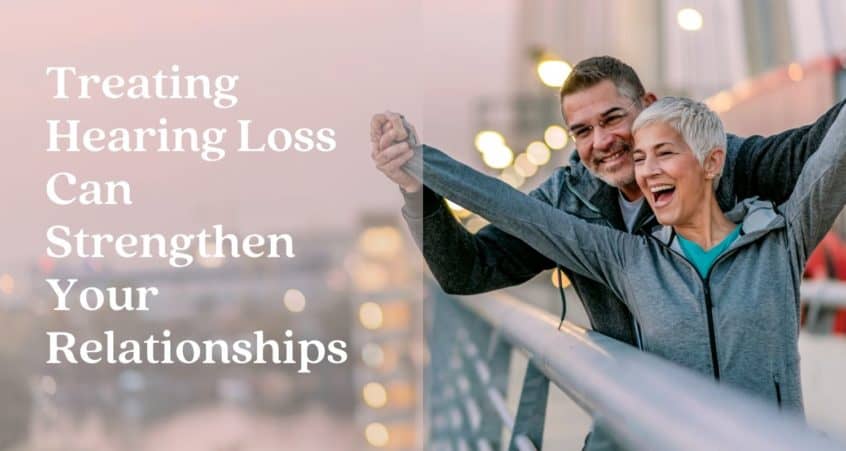Treating Hearing Loss Can Strengthen Your Relationships

About half of us can expect to have hearing loss by the time we reach age 75. While protecting our ears from loud sound is important, that doesn’t guarantee we won’t encounter hearing loss at some point. Loud sound causes hearing loss, but there are many other contributing factors, as well. Hearing loss has been linked to poor diet, poor cardiovascular health, genes, and more. There are likely even some causes that modern medicine has not yet identified.
Once hearing loss does enter the picture, the most important next step is to start treatment with hearing aids. Hearing aids are still the best treatment option for most cases of sensorineural hearing loss, and they’re better than ever thanks to myriad technological advances in recent decades.
Untreated Hearing Loss Strains Partnerships
It’s easy to think of hearing loss as something that happens to us, but we should remember that hearing loss does not occur in a vacuum. Our hearing loss is likely to affect others, as well—and the people closest to us are likely to feel it the most strongly.
In couples where one partner has hearing loss and the other does not, untreated hearing loss is a major stressor on the relationship. Untreated hearing loss can bring out feelings of embarrassment, distress, and frustration for both partners.
There is a tendency for both the hearing-impaired and normal-hearing partner to feel there is a loss of spontaneity in the relationship. Exchanging small talk, sharing observations or incidents that are noticed at the moment—are some of the major things that help us feel connected to one another. When we lose the ability to share life as it comes, our relationship begins to suffer.
Even the most understanding partners can become frustrated and feel isolated when communication breaks down. A loss of communication due to hearing loss can be just as damaging as a loss in communication due to other problems. Whatever the cause may be, we all want to return to feel connected to our partners.
A Study On Hearing Loss In Relationships
Action on Hearing Loss, the largest charity organization working on hearing loss in the UK, conducted interviews with 23 couples. In every couple, one partner had hearing loss and the other did not. The goal was to answer the question: “How do partners and their families respond to hearing loss?”
Hearing-impaired partners noted that their normal-hearing partners were often supportive and helped them to realize not only that they had hearing loss, but the times when it was preventing their awareness of something. They also tended to encourage treatment with an audiologist.
However, they also noted that their partners had difficulty understanding the times that hearing loss made things more difficult for them. They tended not to realize just how exhausting hearing loss can be, or how background noise could make hearing loss more problematic than when surroundings were quieter.
Both partners indicated that there had been a change in the nature and content of their conversations as a result of hearing loss. Namely, the “little things” were more difficult to communicate, and so we’re often left out. Both partners felt this as a loss of intimacy.
Some common negative side effects that couples noted included:
- Frustration
- Resentment for how a hearing partner had to make up for the hearing-impaired partner’s hearing loss—normal-hearing partners often felt like “translators”
- Both partners felt lonelier like they were missing out on the companionship their relationship used to provide
- Less frequent social activities—hearing loss limited the energy that a hearing-impaired partner had for social events and limited their joy in the midst of those activities
- Decrease in intimacy and joking
- Increased miscommunication
- Decrease in shared activities, like watching TV or seeing movies together
- Sense of loss of companionship
- Less communication generally—fewer words used to communicate
Hearing Aids Can Help
Numerous studies indicate that hearing aids can help couples restore their sense of intimacy and companionship. The process is very simple—hearing aids help us hear more easily, so communication can flow more like it did before hearing loss came into the picture.
Today’s hearing aids are marvels of technology that can help reduce background noise, increase spatial awareness, and even automatically switch their programming to be appropriate for different environments as we move through them.
